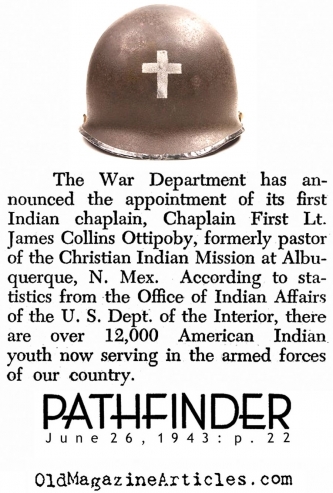A foremost scholar in the field of Native American Music insisted that the American Indian had a guiding roll in the development of Rag Time:
"Most people instinctively assign it to the Negro; but the Indian also, according to Natalie Curtis Burlin (1875-1921), is to be credited with a hand in it. The syncopation, which is a predominant feature of all Rag Time,as she observes in 'The Craftsman', is an absolutely essential element in the songs of our North American Indians of many tribes." Also discussed are the efforts of Geoffrey O'Hara to make the earliest recordings of Native American Music on behalf of the U.S. Library of Congress. You will see that during the First World War it was not beyond the editors of THE STARS and STRIPES to indulge in ethnic stereotyping from time to time and, to be sure, they exploited that privilege in the attached article ("Yank Indian was Heap Big Help in Winning the War") yet regardless of this fact, the performance of the American Indian soldiers on the Western Front got high marks for a number of valued military skills from many of the French and British officers who came in contact with them. It was not simply their ability to shoot well that inspired the praise, but their nocturnal instincts while patrolling in the darkness of No-Man's-Land as well as a unique sense of bravery.
The article is rich with a number of factoids that the Western Front reader will no doubt enjoy; among them, mention is made of German women serving in combat. Twenty five years after the long march that has come to be known as the 'Trail of Tears', an account of that sad injustice was written by one of the first archeologists of the American south-west, O.K. Davis. "The troops and Indians marched side by side for two days for Fort Bowie. Then, Geronimo, Natchez, and about twenty men...escaped..." The second half of the article is available upon request. "It was the Prussian Guard against the American Indian on the morning of October 8 in the hills of Champagne". "The last of the companies of Indians enlisted in the regular army of the United States has been mustered out after six years trial, at Omaha, Nebraska. The Omaha WORLD-HERALD intimates that the failure of the experiment may not be entirely due to the Indians."
The journalist reporting on this matter opined that all subjugated people should never be expected to fight for a tyrannical government. Here are five letters to the editor written in response to an article that appeared in one of the Spring, 1944, issues of PATHFINDER MAGAZINE that pertained to two Native American tribal edicts that forbade the use of alcohol.

MORE ARTICLES >>> PAGE: * 1 * 2 * 3 * | |